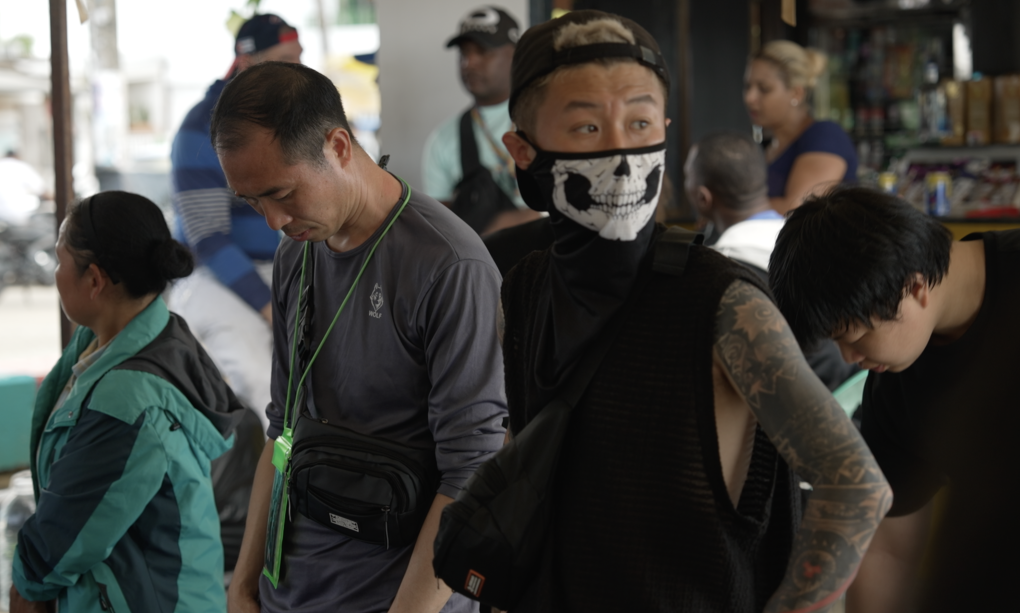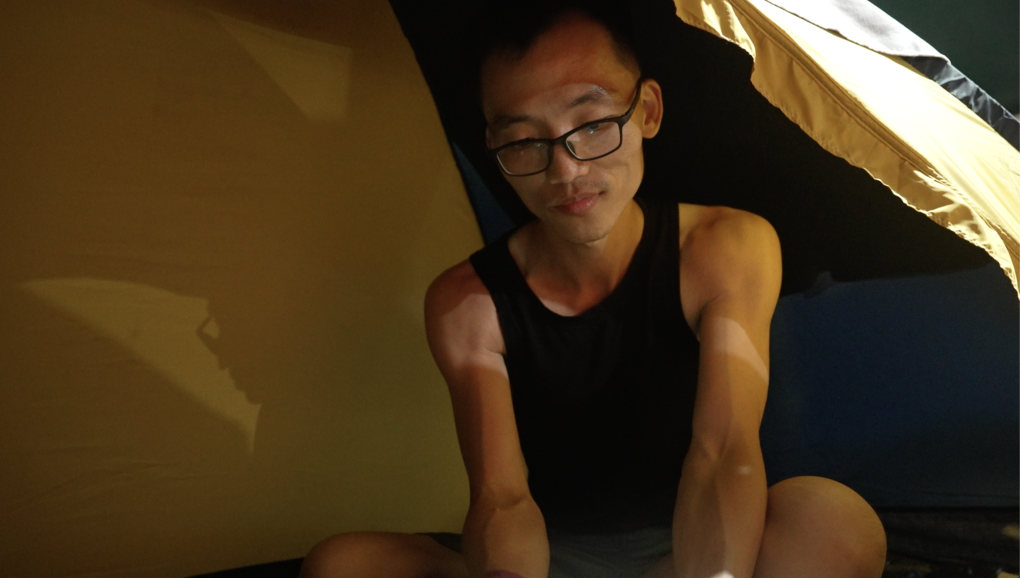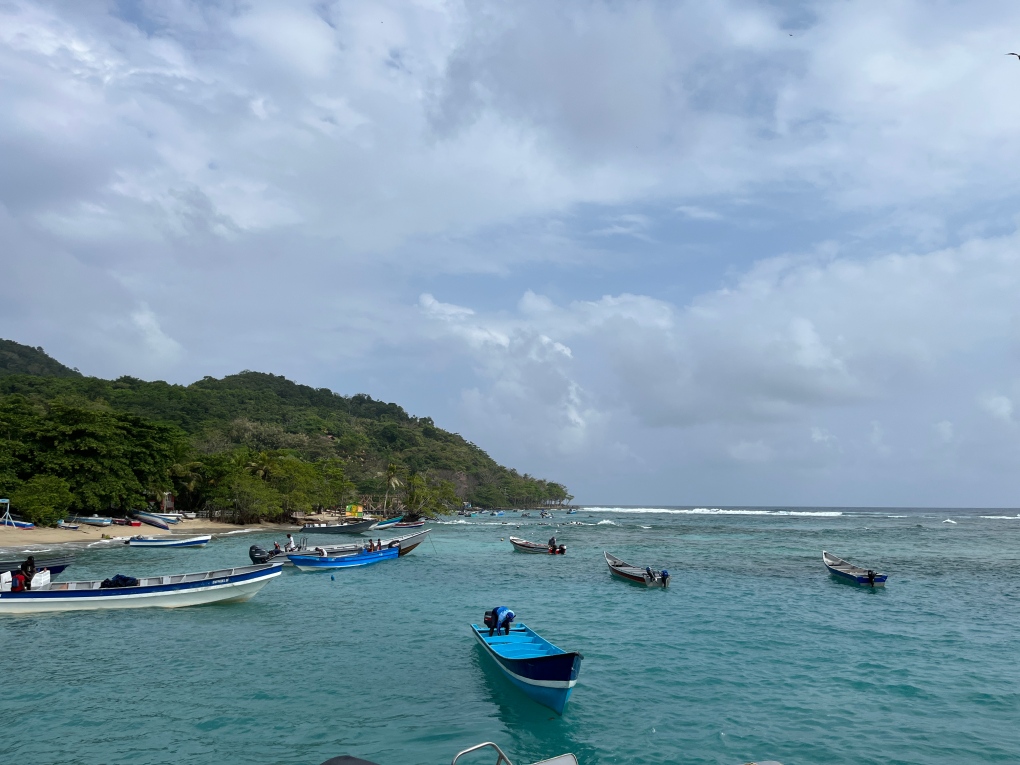In search for freedom, Chinese migrants increasingly risk it all by braving the Darien Gap
The waves were crashing down so hard, their boat began taking on water.
Yet all Li could hear in the darkness of the night were the piercing screams of children.
Li was aware of others who died after their vessels capsized in this stretch of water. He and the others onboard feared they would be next.
“[We] really thought they would die,” he said. “[The passengers] kept asking God for blessings.”
This was supposed to be a shortcut for Li: a boat ride that would sneak him and approximately 40 other migrants from the coastal tourist town of Capurgana, Colombia to a beachfront just west in Panama.
- Avery Haines, W5's Host and Managing Editor, shares her personal account
- From the point of view of W5's Director of Photography Jerry Vienneau
The boat ride would allow them to bypass a large chunk of the Darien Gap, a treacherous stretch of jungle between Colombia and Panama, known for being a narco trafficking route and more recently for the high rates of robberies and sexual assaults.
 Chinese are now the fourth largest nationality to make the perilous jungle journey across the Darien Gap en route to North America (CTV W5)
Chinese are now the fourth largest nationality to make the perilous jungle journey across the Darien Gap en route to North America (CTV W5)
The roughly 100-kilometre route has become the go-to path for migrants trying to get to the United States and Canada, with a record 520,000 people crossing it last year.
Migrants from China were the fourth nationality outside of Venezuela, Haiti and Ecuador to do the trek, according to Panamanian government statistics.
Li, whose name we’ve changed to protect his family in China, is among the growing number of Chinese citizens who have fled their country due to economic hardships and increasing political oppression in recent years -- and one of the several W5 met during its journey through the Darien Gap. Many of them pay for smugglers and can afford to take what’s described as the VIP route to cross.
Li and his wife paid close to $2000 for that luxury.
However, the trip didn’t go as planned.
 A growing number of Chinese who have fled their country due to economic hardships and increasing political oppression in recent years (Jerry Vienneau / CTV W5)
A growing number of Chinese who have fled their country due to economic hardships and increasing political oppression in recent years (Jerry Vienneau / CTV W5)
Panama’s national border patrol spotted the vessel as they were about to make landfall and their smugglers frantically took off to avoid getting caught.
Then the sea became so turbulent it felt like the waves were trying to swallow their vessel. The passengers, many of whom were from China, were bounced around like ping-pong balls. One person, according to Li, had his teeth knocked out. Others lost their survival gear when it fell into the sea.
“It was very scary. It was so dangerous,” said Li. “I was regretting making the trip.”
Chinese disillusionment
Li said he never wanted to leave China.
He had a wife, two kids and a well-paying job at a company that manufactures parts for international automakers in Sichuan province.
“I was very satisfied with my life,” he said through a translator.
But in 2020 everything changed. While at the airport, poised to go on a vacation, authorities asked him and his family the purpose of their trip. After searching their phones, they discovered Li had watched a video on Douyin, China’s version of Tik-Tok, about making a trek to the United States.
Li insisted he didn’t intend to flee China, but local authorities didn’t believe him. They prevented him from getting on the plane and went as far as forbidding him from leaving the city where he lived for a year.
“I was living constantly under fear,” said Li. “I kept fearing local authorities would come to my door.”
Since he couldn’t leave his city, he lost his job because it was in a neighbouring town.
That experience helped crystallize his views of the Chinese Communist party (CCP). He said it “defies human rights and the liberties of Chinese citizens.”
He knew he had to leave China.
“I want freedom,” he said.
 Chinese citizens were the fourth largest nationality outside of Venezuela, Haiti and Ecuador to do the Darien Gap in 2023 (Jerry Vienneau / W5)
Chinese citizens were the fourth largest nationality outside of Venezuela, Haiti and Ecuador to do the Darien Gap in 2023 (Jerry Vienneau / W5)
Mary Oyen, associate professor of History and Asian Studies at the University of Maryland, said there’s a common theme to Li’s story as more Chinese citizens become disillusioned with the overreach of the Chinese Communist Party.
“I can live a good life, I can take care of my family. When that's completely wiped out, you lose all faith in the society that you're in and you say, ‘All right, I'm not doing this anymore. I'm not doing it again to only have it taken away again,’” said Oyen.
Chinese asylum seekers nearly doubled in 2023
While China’s GDP has continued to grow — albeit at a slower rate than in previous decades — consumer confidence has also declined. China’s harsh Zero-COVID policies, high youth unemployment and sluggish real estate sector are just some of the factors contributing to a growing malaise.
“The [Chinese] who are making the trip are doing it because they are feeling a sense of urgency and that sense of urgency comes from a combination of economic and political factors,” said Oyen. “[It has] increased the hopelessness quotient for people.”
In Canada, the number of Chinese asylum-seekers almost doubled from 2022 to 2023, according to data from the Immigration and Refugee board of Canada.
South of the border, between 2022 and 2023, U.S. Customs and Border Protection data shows a ten-fold increase of Chinese nationals who have been detained.
 W5 met Xinyang in the Darien Gap after he fled China in December (Jerry Vienneau / CTV W5)
W5 met Xinyang in the Darien Gap after he fled China in December (Jerry Vienneau / CTV W5)
Another Chinese migrant W5 met during its journey through the Darien Gap is Xinyang.
From Zhangzhou, a city of around five million, Xinyang became disillusioned by life in China during the pandemic, where he would often be confined to his apartment for long periods of time.
Feeling isolated and frustrated, he made a disparaging remark about a high-ranking communist party official on social media.
Not long after, police knocked at his door.
They had traced the source of the post back to him. He said they tried to evict him from his apartment and began threatening him and his family saying they “would lose their social mobility.”
“I have little faith in China,” he said. “I can't express myself in China.”
He left his country in December 2023.
But like most people from China, he had to take a circuitous route just to get to the Darien Gap: travelling from Hong Kong, Malaysia, Turkey and Ecuador before entering Colombia.
When W5 met him, he showed the only food he had for the trip — a few hard boiled eggs.
Knowing the dangers, his goal was to pass through the Darien Gap as quickly as possible. So instead of taking main paths, he followed other migrants who had found shortcuts.
But that, he admits now, came with its own risks. At one point, instead of going along a riverbank, he decided to follow a group of migrants who were going across the river to save time.
The water was two metres deep. And he couldn't swim.
“It was foolish. I tried to swim in the river but I failed,” he said. “I started to panic.”
He started to go under, but said a fellow migrant noticed and pulled him out.
 Chinese migrants trying to get across the U.S border through Tijuana, Mexico (Xinyang photo)
Chinese migrants trying to get across the U.S border through Tijuana, Mexico (Xinyang photo)
It took him two days to get out of the jungle and several weeks before he crossed the U.S border in Tijuana, Mexico. He is currently living near Los Angeles, California.
He said it was a long, arduous journey, but under no circumstance would he ever go back to China.
“I feel more like myself,” he said. “I can express myself.”
'I’m very lucky'
Meanwhile, Li’s boat did eventually get to a beach near Puerto Escoce, Panama later that evening.
But the trip didn’t get any easier. Many of the migrants no longer had any food or clean water and they still had at least two days of trekking ahead of them.
At one point, one of Li’s friends lost his wife and child in the jungle. He said his friend paid a Panamanian guide hundreds of dollars to look for them. The guide eventually found them.
After three days, they arrived at a Panamanian migrant centre.
“I’m very lucky,” he said, through a translator. “God protects me and my life.”
 Smugglers take boats full of migrants from the Colombian tourist town of Capurgana to Panama (Eric Szeto / W5)
Smugglers take boats full of migrants from the Colombian tourist town of Capurgana to Panama (Eric Szeto / W5)
He and his wife crossed the Tijuana, Mexico border into the U.S in February. They are now in Los Angeles working illegally, trying to save money after spending close to $75,000 for this trek. They plan to eventually bring their two kids and parents, who are still in China, to the U.S.
“If I have trouble getting a Green Card,” said Li. “I hope to go to Canada to get permanent residency.”
Watch W5’s 'Narco Jungle: The Darien Gap' in our video player at the top of this article
CTVNews.ca Top Stories

Invasive and toxic hammerhead worms make themselves at home in Ontario
Ontario is now home to an invasive and toxic worm species that can grow up to three feet long and can be dangerous to small animals and pets.
I just don't get Taylor Swift
It's one thing to say you like Taylor Swift and her music, but don't blame CNN's AJ Willingham's when she says she just 'oesn't get' the global phenomenom.
Tornadoes collapse buildings and level homes in Nebraska and Iowa
Tornadoes wreaked havoc Friday in the Midwest, causing a building to collapse with dozens of people inside and destroying and damaging hundreds of homes, many around Omaha, Neb.
opinion RFK Jr.'s presidential candidacy and its potential threat to Biden and Trump
Although it's still unclear how much damage Robert F. Kennedy Jr.'s candidacy can do to either Joe Biden or Donald Trump this election, Washington political columnist Eric Ham says what is clear is both sides recognize the potential threat.
Cisco reveals security breach, warns of state-sponsored spy campaign
State-sponsored actors targeted security devices used by governments around the world, according to technology firm Cisco Systems, which said the network devices are coveted intrusion points by spies.
Loud boom in Hamilton caused by propane tank, police say
A loud explosion was heard across Hamilton on Friday after a propane tank was accidentally destroyed and detonated at a local scrap metal yard, police say.
Decoy bear used to catch man who illegally killed a grizzly, B.C. conservation officers say
A man has been handed a lengthy hunting ban and fined thousands of dollars for illegally killing a grizzly bear, B.C. conservation officers say.
Last letters of pioneering climber who died on Everest reveal dark side of mountaineering
George Mallory is renowned for being one of the first British mountaineers to attempt to scale the dizzying heights of Mount Everest during the 1920s. Nearly a century later, newly digitized letters shed light on Mallory’s hopes and fears about ascending Everest.
From New York to Arizona: Inside the head-spinning week of Trump's legal drama
The first criminal prosecution of a former president began in earnest with opening statements and testimony in a lower Manhattan courtroom. But the action quickly spread to involve more than half a dozen cases in four states and the nation's capital. Twice during the week, lawyers for Trump were simultaneously appearing in different courtrooms.
Local Spotlight

DonAir force takes over at Oilers playoff games
As if a 4-0 Edmonton Oilers lead in Game 1 of their playoff series with the Los Angeles Kings wasn't good enough, what was announced at Rogers Place during the next TV timeout nearly blew the roof off the downtown arena.
'It was instant karma': Viral video captures failed theft attempt in Nanaimo, B.C.
Mounties in Nanaimo, B.C., say two late-night revellers are lucky their allegedly drunken antics weren't reported to police after security cameras captured the men trying to steal a heavy sign from a downtown business.
Fergus, Ont. man feels nickel-and-dimed for $0.05 property tax bill
A property tax bill is perplexing a small townhouse community in Fergus, Ont.
Twins from Toronto were Canada's top two female finishers at this year's Boston Marathon
When identical twin sisters Kim and Michelle Krezonoski were invited to compete against some of the world’s most elite female runners at last week’s Boston Marathon, they were in disbelief.
Mystery surrounds giant custom Canucks jerseys worn by Lions Gate Bridge statues
The giant stone statues guarding the Lions Gate Bridge have been dressed in custom Vancouver Canucks jerseys as the NHL playoffs get underway.
'I'm committed': Oilers fan won't cut hair until Stanley Cup comes to Edmonton
A local Oilers fan is hoping to see his team cut through the postseason, so he can cut his hair.
'It's not my father's body!' Wrong man sent home after death on family vacation in Cuba
A family from Laval, Que. is looking for answers... and their father's body. He died on vacation in Cuba and authorities sent someone else's body back to Canada.
'Once is too many times': Education assistants facing rising violence in classrooms
A former educational assistant is calling attention to the rising violence in Alberta's classrooms.
What is capital gains tax? How is it going to affect the economy and the younger generations?
The federal government says its plan to increase taxes on capital gains is aimed at wealthy Canadians to achieve “tax fairness.”














































